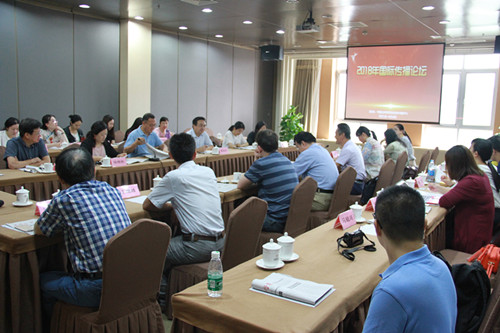
. > WHAT'S NEW > CONFERENCES
Scholars: Individuals to play crucial role in international communication
Author : WANG JUN MEI, REN GUANHONG and SHAO YIJIA Source : Chinese Social Sciences Today 2018-07-17

Scholars discuss ways to improve China’s international communication at a recent forum held by the Social Sciences in China Press. (MA YUHONG/CSST)
Recent news headlines were occupied by Japanese football fans who took away all their litter after they finished watching a 2018 FIFA World Cup game at a stadium in Russia. It was a good example of the influences of individual behavior on international communication and Chinese communication studies should pay more attention to these incidents, scholars said.
Jiang Anquan, deputy editor-in-chief of the Global Times, said that those Japanese fans showed high civility and it was quite an effective form of communication.
Jiang gave these comments at the recent Forum on International Communication 2018 held by the Social Sciences in China Press.
The challenges and opportunities within China’s international communication efforts were among the most heated topics discussed at the forum.
Jiang said that China remains in a weaker position than Western countries within the international framework of communication. The situation has become more complex, and Chinese media fail to conduct enough investigations into the needs of the audience, he noted.
The audience should be considered as consumers of information, and the communication market should be further categorized into smaller ones, so as to make full use of human and financial resources, Jiang suggested.
Chen Long, dean of the School of Communication at the Soochow University, agreed that China lags behind in terms of discourse power. China still faces the challenges of weak soft power, differences between Chinese and Western discourse systems as well as insufficient communications between young people from China and Western countries.
China’s disadvantaged position in international communication, despite efforts to broaden its channels for international communication, could largely be attributed to the Western-dominated discourse system, said Jia Wenshan, a research fellow from the National Academy of Development and Strategy at the Renmin University of China.
In addition, Chinese scholars on communication studies have yet to establish their topics of research as a systemic discipline, Jia said. For example, studies on the “Belt and Road” initiative could be further improved with the help of different disciplines. Based on this, Chinese scholars would be able to build their own knowledge system, and, together by using the international system of academic studies for reference, to continuously enrich and deepen their studies on certain topics, he said.
Zhang Yanqiu, director of the Center for African Media Studies at the Institute of Communication Studies, Communication University of China, said that Chinese media should change their methods of communication and pay more attention to the needs of the audience, which was a precondition for the effectiveness of public diplomacy and international communication.
Zhang suggested that the romantic way of reporting positive news and the stereotyped way of reporting negative news when reporting news about African countries compromised Chinese media’s influence. In response to this, Zhang proposed the idea of “constructive news,” which meant pointing out the problem and proposing solutions rather than simply evading the bad news. This would accord with the critical thinking of reportage and overcome the disadvantages of “conflicting reports,” highlighting the social responsibility of news media, Zhang said.
Jia said that the social sciences in the Western countries were undergoing crises as most theories were still in the period of mass communication, and the popular big data research was the key method rather than developing new theories. Under such circumstances, Jia suggested that, from the perspective of global academic communication, Chinese scholars should translate and introduce the recent achievements of Chinese academic circles to the world. Meanwhile, recent foreign academic achievements could also be interpreted from the Chinese perspective, Jia said.
Addressing the challenges facing Chinese international communication, Chen suggested a deeper reflection on the cultural aspects of communication and systematic efforts to narrow the “discourse gap.” Chinese media should pay attention to the cultural taboos and use the discourse rhetoric in a more ingenious way, he said. In addition, Chen suggested more communications between the younger generations of the people in China and the rest parts of the world. The larger group of Chinese who understood the West, the more effective China’s international communication would be, he said.
In his keynote speech, Justin Ward, an editor of the English version of Chinese Social Sciences Today, suggested the combination of Chinese Taoist philosophy with the principles and methods of news writing and translation. The activity of translation should strike a balance between faithfulness to the original texts and the readability of translated version, he said. As the Taoists suggest, the greatest approaches are the simplest ones. Ward said that clean and simple words would make the stories less redundant and more readable.
(Edited and translated by CHEN ALONG)
Ye Shengtao made Chinese fairy tales from a wilderness
Ye Shengtao (1894–1988) created the first collection of fairy tales in the history of Chinese children’s literature...
-
How northern ethnicities integrated into Chinese nation
2023-09-18
-
Mogao caves
2023-09-12
-
Mogao Grottoes as ‘a place of pilgrimage’
2023-09-12
-
Time-honored architectural traditions in China
2023-08-29
-
Disentangling the civilizational evolution of China
2023-08-28
-
AI ethics in science fiction
2023-08-23













 2011-2013 by www.cssn.cn. All Rights Reserved
2011-2013 by www.cssn.cn. All Rights Reserved